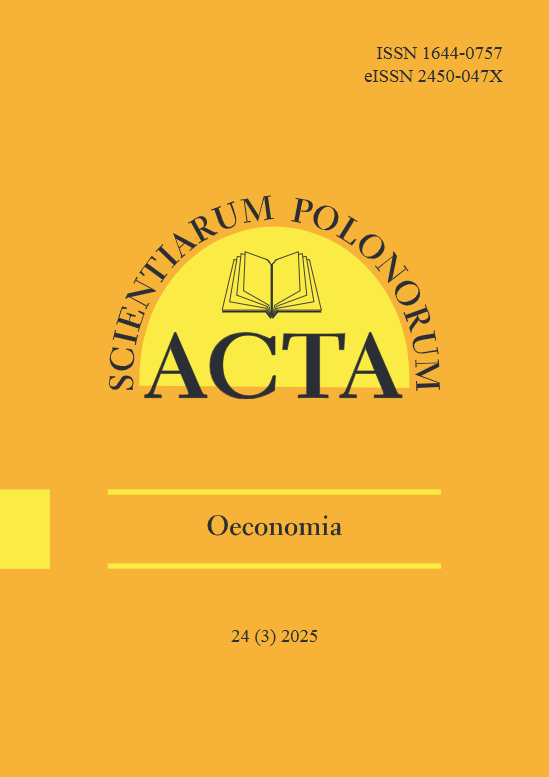Main Article Content
Aim: This study examined the relationship between environmental disclosure practices and the financial performance of manufacturing companies listed on the Nigerian Exchange Group. The objective was to determine whether specific environmental initiatives, such as waste management, resource conservation, energy conservation, emission reduction, and pollution control, significantly impacted financial outcomes. The study aimed to contribute to the ongoing discourse on corporate environmental responsibility and its economic implications. Methods: The study adopted a quantitative research approach, utilizing secondary panel data from 15 listed manufacturing companies over a defined period. Environmental disclosure practices were measured across five components: waste management practices, resource conservation, energy conservation, emission reduction, and pollution control. The Levin–Lin–Chu unit root test was used to confirm the stationarity of the data series. A Pearson correlation matrix was applied to explore interrelationships among the variables. The study employed panel data regression analysis with a random effects model (confirmed by the Breusch–Pagan Lagrange multiplier test), grounded in signaling theory as the theoretical framework to estimate the effects of environmental practices on financial performance. Results: The results indicated that energy conservation, emission reduction, and pollution control practices significantly enhanced financial performance. Resource conservation showed a positive but less substantial impact. Conversely, waste management practices were negatively associated with financial outcomes, suggesting potential inefficiencies or cost implications. Conclusions: The study concluded that manufacturing firms should prioritize energy conservation, emission reduction, and pollution control within their environmental strategies to improve long-term financial performance and investor perception. A strategic review of waste management practices was also recommended.
Article Details
Adegbie, F.F., Adesanmi, A.A. (2020). Environmental disclosure and corporate sustainability: The role of liquidity management. European Journal of Accounting, Auditing and Finance Research, 8(8), 30‒72.
Adegbie, F.F., Ogidan, A.A., Siyanbola, T.T., Adebayo, A.S. (2020). Environmental accounting practices and share value of food and beverages manufacturing companies quoted in Nigeria. Journal of Critical Reviews, 7(13), 2256‒2264.
Aguguom, T.A., Ajayi, A. (2020). Quality of accounting numbers and shareholders wealth maximization: Empirical evidence for investment decisions in Nigeria. International Journal of Finance and Accounting, 9(3), 45‒55. https://doi.org/10.5923/j.ijfa.20200903.01
Brammer, S., Millington, A. (2008). Does it pay to be different? An analysis of the relationship between corporate social and financial performance. Strategic Management Journal, 29(12), 1325‒1343. (Crossref)
Environmental Protection Agency [EPA] (2021). Guidelines for environmental management and reporting. EPA Publications. Retrieved from https://www.epa.gov/laws-regulations/epa-guidance-documents [accessed: 10.11.2024].
Friedman, M. (1970). The social responsibility of business is to increase its profits. The New York Times Magazine, September 13, 32‒33. Retrieved from https://www.nytimes.com/1970/09/13/archives/a-friedman-doctrine-the-social-responsibility-of-business-is-to.html
[accessed: 10.11.2024].
Financial Reporting Council of Nigeria [FRCN] (2018). Nigerian Code of Corporate Governance. Retrieved from https://icsan.org/wp-content/uploads/2024/11/Nigerian-Code-of-Corporate-Governance-2018.pdf [accessed: 10.11.2024].
Global Reporting Initiative [GRI] (2020). GRI Standards: Comprehensive set of sustainability reporting standards. GRI Publications. Retrieved from https://www.globalreporting.org/standards [accessed: 10.11.2024].
Hart, S.L. (1995). A natural-resource-based view of the firm. Academy of Management Review, 20(4), 986‒1014. (Crossref)
International Energy Agency [IEA] (2022). Energy efficiency 2022: Global trends and insights. IEA Publications. Retrieved from https://www.iea.org/reports/energy-efficiency-2022 [accessed: 10.11.2024]. (Crossref)
International Organization for Standardization [ISO] (2004). Environmental management systems – Requirements with guidance for use (ISO 14001). ISO Publications. Retrieved from https://www.iso.org/standard/31807.html [accessed: 10.11.2024].
Intergovernmental Panel on Climate Change [IPCC] (2021). Climate change 2021: The physical science basis. Cambridge University Press. Retrieved from https://www.ipcc.ch/report/ar6/wg1/ [accessed: 10.11.2024]. (Crossref)
Jabeen, F., Faisal, M.N., Katsioloudes, M.I. (2020). Entrepreneurial mindset and the role of universities as strategic drivers of entrepreneurship. Journal of Small Business and Enterprise Development, 27(4), 627‒650. https://doi.org/10.1108/JSBED-07-2016-0117 (Crossref)
Jeroh, E., Okoro, G.E. (2016). Effect of environmental and dismantling costs on firm performance among selected oil and gas companies in Nigeria. Sahel Analyst: Journal of Management Sciences, 14 (5), 14‒26.
Kaur, A., Lodhia, S. (2019). Key issues and challenges in stakeholder engagement in sustainability reporting: A study of Australian local councils. Pacific Accounting Review, 31(1), 2‒18. https://doi.org/10.1108/PAR-11-2017-0092 (Crossref)
Klassen, R.D., McLaughlin C.P. (1996). The impact of environmental management on firm performance. Management Science, 42(8), 1199‒1214. https://doi.org/10.1287/mnsc.42.8.1199 (Crossref)
Margolis, J.D., Walsh, J.P. (2003). Misery loves companies: Rethinking social initiatives by business. Administrative Science Quarterly, 48(2), 268‒305. (Crossref)
Mokhtar, M., Jusoh, R., Zulkifli, N. (2016). Environmental management accounting and its impact on resource efficiency and waste management. Asian Journal of Business and Accounting, 9(2), 103‒121.
Obida, S.S., Owolabi, S.A., Enyi, P.E., Akintoye, I.R. (2019). Environmental disclosure practices and stock market return volatility in the Nigerian Exchange Group. International Journal of Scientific and Research Publications, 9(7), 95‒108. https://doi.org/10.29322/IJSRP.9.07.2019.p9113 (Crossref)
Odoemelam, V.O., Okafor, R.G. (2018). The influence of corporate governance on environmental disclosure of listed non-financial firms in Nigeria. Indonesian Journal of Sustainability Accounting and Management, 2(1), 25‒49. https://doi.org/10.28992/ijsam.v2i1.47 (Crossref)
Porter, M.E., Linde, C. van der (1995). Toward a new conception of the environment-competitiveness relationship. Journal of Economic Perspectives, 9(4), 97‒118. https://doi.org/10.1257/jep.9.4.97 (Crossref)
Radu, C. (2018). Financial performance measurement in manufacturing companies. Journal of Manufacturing Systems, 45, 167‒175.
Rosen, C.M., Miller, G.T. (2001). Environmental management and corporate profitability: Evidence from the pulp and paper industry. Business Strategy and the Environment, 10(3), 146‒157.
Spence, M. (1973). Job market signaling. The Quarterly Journal of Economics, 87(3), 355‒374. https://doi.org/10.2307/1882010 (Crossref)
United Nations Global Compact (2021). Corporate sustainability reporting: A practical guide. UN Global Compact Office. Retrieved from https://unglobalcompact.org/participation/report [accessed: 10.11.2024].
World Health Organization [WHO] (2020). Environmental health reports: Global assessment of pollution and health impacts. WHO Press. Retrieved from https://www.who.int/publications/i/item/9789241511353 [accessed: 10.11.2024].
Downloads
- Niyi Oladipo Olaniyan, Ayodele Temitope Ekundayo, Oladimeji Emmanuel Oluwadare, Theresa Omolade Bamisaye, FORENSIC ACCOUNTING AS AN INSTRUMENT FOR FRAUD DETECTION AND PREVENTION IN THE PUBLIC SECTOR: MODERATING ON MINISTRIES, DEPARTMENTS AND AGENCIES IN NIGERIA , Acta Scientiarum Polonorum. Oeconomia: Vol. 20 No. 1 (2021)

This work is licensed under a Creative Commons Attribution-NonCommercial 4.0 International License.





